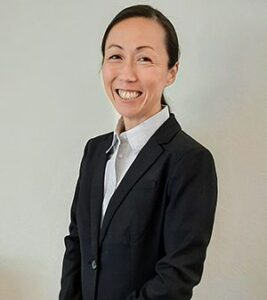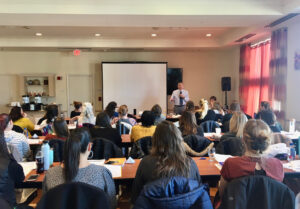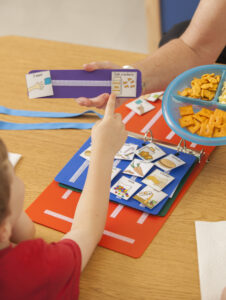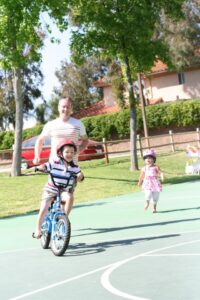By Jaime Wedel, M.Ed., CAGS, BCBA
This month, I spoke to Dr. Keiko Suzuki, the Clinical and Operational Manager of Pyramid Educational Consultants Japan, and a United States Pyramid Consultant. 
If you read our January blog, “5 Things you Probably Didn’t Know About PECS,” you will know that PECS® (Picture Exchange Communication System®), and the Pyramid Approach®, incorporate methodologies from the field of Applied Behaviour Analysis, or ABA. ABA approaches have been around for decades, but as they’ve become increasingly popular, we’ve heard some people worry about using the strategies, thinking they can be tough on learners. Of course, the field is very broad, but I loved hearing Keiko talk about her family’s experience with ABA. I remember her saying, “From when my son was born, until we discovered ABA, I was a lost parent.”
Thank you so much for talking to me today! Of course, everyone’s journey is going to be unique, but I find your family’s path so interesting and inspiring; I think hearing a little about it will encourage others. I know you’re a Board Certified Behaviour Analyst (BCBA), and that you also have a Ph.D. How did your education unfold along with your son’s diagnosis?

When did you know that your son would need some extra help?
Before he was a year old, I had suspected something was different about him. I initially thought he was deaf since he did not respond to his name and simple directions, and he wasn’t speaking. Later he was self-injurious, and could label some things, but had no functional communication, everything was led by the hand to where he wanted us to help him, and then I had to guess what he needed. He had every characteristic of autism which I found out later once I started my course work.
I know there are a lot of treatments we all read and hear about, what drew you to ABA?
In ABA, you take data and decide where to go based on data, you can see it and is concrete versus in traditional psychology, and some other programs, where you don’t really know what progress is being made as there is no data to fall back on. When I was introduced to ABA as a mom, people were taking data, and I knew I could trust this, as decisions were based on data rather than prediction or assumption. Just like in my scientific research, you have solid evidence to show why you have made a decision. Also, behaviour analysis has been studied for many years and is research based.
Once we started ABA services, I learned how to teach my son to play, how to follow directions, and how to imitate. They also taught him to tap mommy when he needed things rather than grabbing me or hitting me. I learned to use a token system and visual schedules in a way that was easily implemented throughout the day.

Your son was a PECS user?
He went to a special education pre-school and was introduced to PECS. He learned very quickly, once he had a picture, for example of a fish cracker, that he could get this thing. He would give pictures to the therapist and teacher at school and then he started bringing the pictures home. He started saying sounds around when he would have been introduced to Phase IV (sentences) and then was transitioned to speech.
Now looking back, I wish he would have used PECS longer so that he would have understood the sentence format, including adjectives and adverbs. He was already labeling the object, he would say, “Goldfish, Goldfish please.” He did have a good vocabulary but did not formulate sentences. To me, right now, he still mixes adjectives and word placements, and it could have helped him learn this crucial skill if he had used PECS longer. He is a visual learner.
The teacher assumed since he was talking, we should transition, but at a PECS Training we talk about how PECS can build on speech and language development. He was also very echolalic, he didn’t always use functional communication. I remember asking his speech therapist, “How long will this last, this is driving me crazy!”

He had OT (Occupational Therapy) from when he was diagnosed. They would do things like have him put clothes pins and coins in containers. OT did work on balance but did not use a bike, so I worked on it with my husband, who is a cyclist. We had a tricycle with a pole we would push, but my son has always been big and tall for his age, and he looked silly on the small tricycle. We got him a bike with training wheels. We worked on the bike and used the Backwards Chain until he could ride without training wheels pedaling on his own. My family is going on a 500-mile cycling trip around Scotland next year! We’re working on him navigating while riding his road bike, we’d love to see him drive and that’s a skill he’ll need. I try to use the approaches at home, embedding everything naturally across the day.
I love that approach of not stopping real-life to teach lessons, but going about real-life with our students, and embedding our lessons into daily life! That’s a big part of what we do at Pyramid. We also use Physical Prompts sometimes, and I remember your pre-teen daughter listening to part of a conversation we had with colleagues about how some people have been hesitant when they hear that. She was so surprised!
My daughter is very active in ballet. She said, “If you don’t know the term or language, such as in ballet, for example; ‘plie’ how will you know what to do? Even if you’ve been shown how to do it, feet together and bend straight down, you may not be in the correct position, you may have your hips out and not bend down straight. You may not be copying correctly from the model.” Teachers sometimes try to vocalize, try to model, but what works is when the teacher would come to you and physically move you, so you learn the position. And then eventually the teacher will take their hands away and the student will independently do it. 
Of course, we’re all motivated when we see our learners gain skills. It’s great to think about your son making the journey from leading you by the hand to things and being pushed on a tricycle, to being a PECS user and riding a bike with training wheels, to now speaking and riding a road bike around Scotland!
Everyone has their right to their opinion. From my personal experience, I am happy that we came across ABA and thankful for people whom we met throughout our journey during our early intervention. There is never going to be a quick fix with everything you encounter in life. The process can be as rough as a stormy sea but once you reach your destination, you will be surprised and happy about your journey. With children, the journey is forever, but you can stop and reflect how far you have come. Now I don’t have to worry when I drop him off at basketball and leave him there until pick up time. This may be just norm to many people but to us, these so called “norms” were big steps and nothing can exchange that feeling. His progress is built upon reinforcer systems, and teaching strategies that we learned in ABA, along with support from speech language therapists and other professionals in our team. Being a parent is a challenge itself and is never ending. It is important to learn that we, as parents also need time to de-compress even 5 minutes of peace and quiet, or a large mug of coffee in the morning. I am still learning this, even my children tell me, “Mom, breathe….”
Thank you so much Keiko, and please thank your family for agreeing to let you share a bit about them. I’m very optimistic that some people reading this will be uplifted and get a little shot of energy to find the best path for them and their family like you did for yours.
© Pyramid Educational Consultants, LLC. 2021
